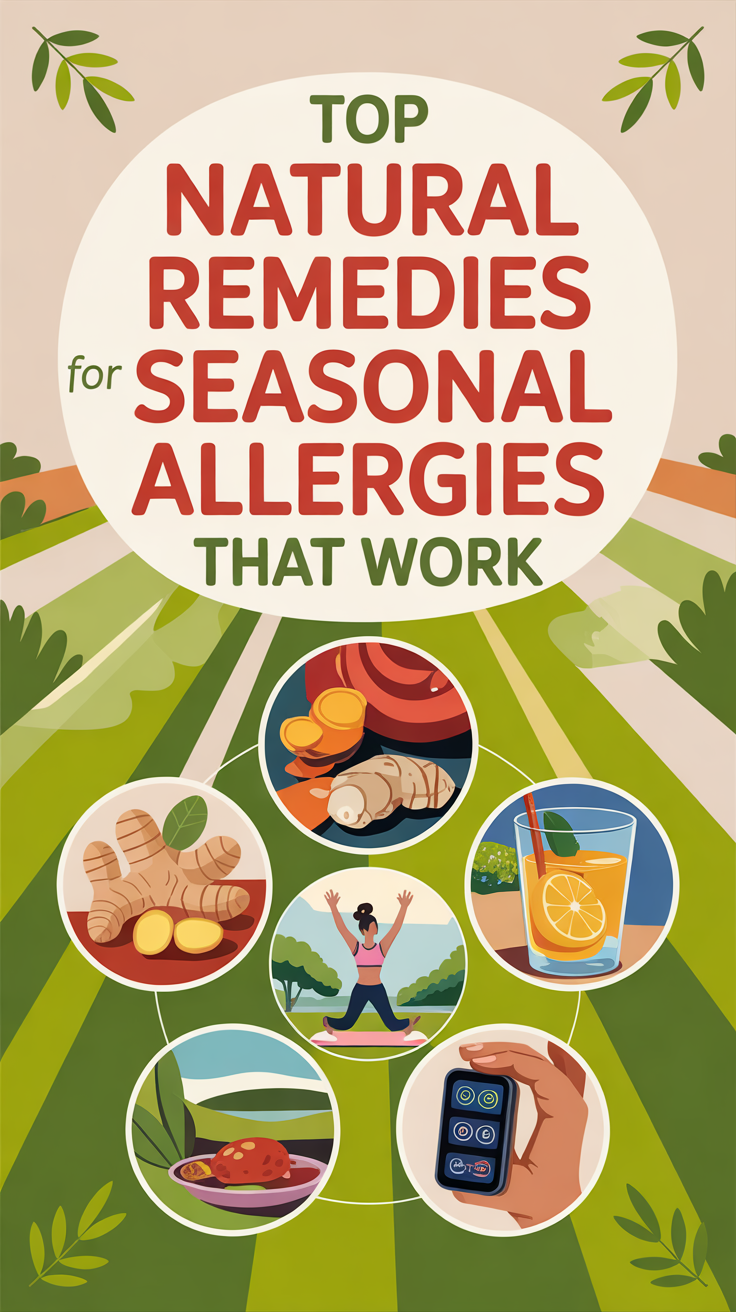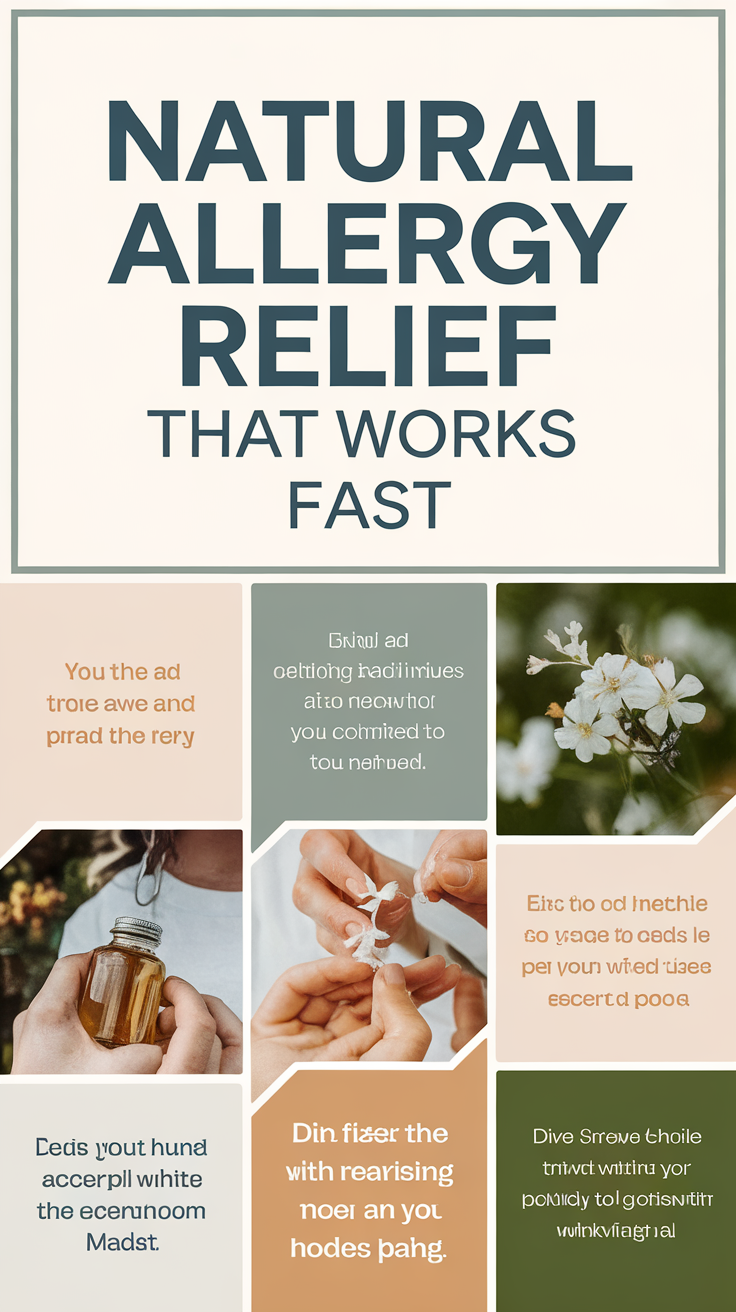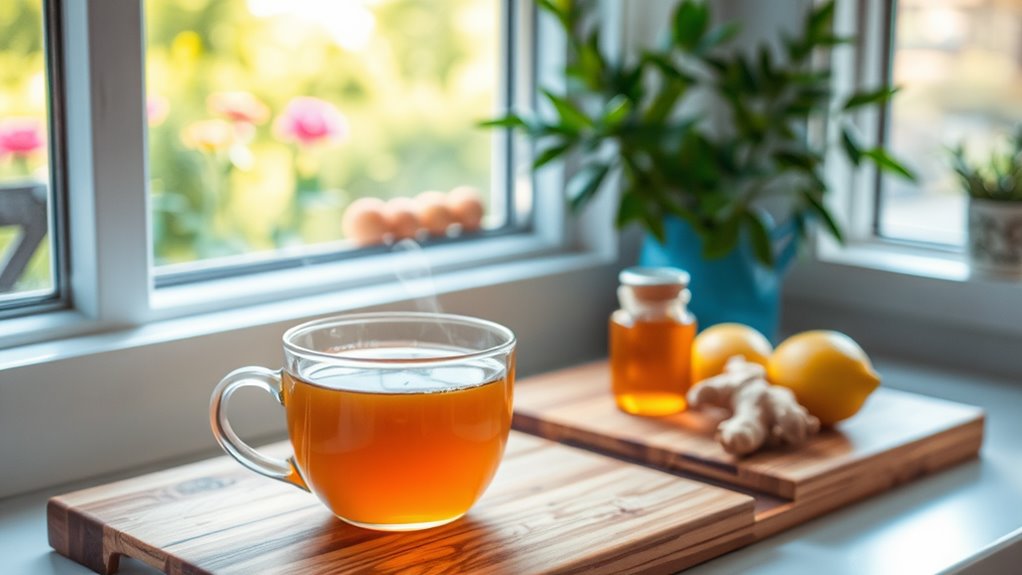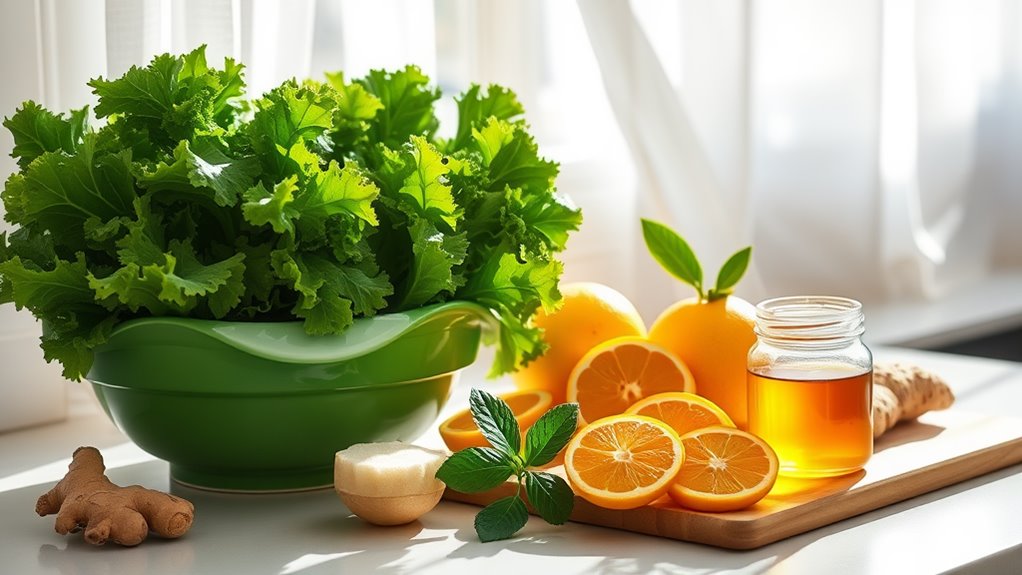Top Natural Remedies for Seasonal Allergies That Work
To tackle seasonal allergies, focus on vitamin C-rich foods like citrus fruits and guava to boost your immune system. Green tea is another powerful ally, thanks to its antioxidants that help reduce inflammation and histamine production. Omega-3 fatty acids, found in fatty fish and flaxseeds, can further lower inflammatory responses. Incorporating these natural remedies can significantly alleviate your symptoms. If you’re curious, there are more effective strategies you can explore.
Vitamin C-Rich Foods for Immune Support
Vitamin C plays a vital role in supporting your immune system, especially during allergy season.
Incorporate foods rich in vitamin C into your diet for effective allergy remedies. Kakadu plums and acerola cherries lead the pack, offering exceptionally high levels. Elderberry’s antioxidant properties also enhance the immune-boosting effects of vitamin C.
Yellow peppers and black currants are great choices, too. Don’t forget guava and citrus fruits like oranges and grapefruits, which not only boost your vitamin intake but also improve iron absorption.
To maximize benefits, consume these foods fresh and avoid prolonged cooking. Vitamin C is vital for collagen synthesis and overall health.
Adding these vitamin C-rich options can enhance your immune response and help combat allergy symptoms effectively.
The Benefits of Green Tea in Allergy Relief
Green tea is packed with antioxidants that can help combat allergy symptoms by reducing inflammation and histamine responses. Green tea hinders mast cell activation and inhibits histamine release, making it an effective option for those suffering from seasonal allergies. Additionally, incorporating local honey into your routine can further enhance its allergy-fighting benefits, as it helps build tolerance to local allergens. Its easy preparation makes adding it to your daily routine a breeze, providing you with quick relief from pesky allergic reactions.
Antioxidant Properties Explained
The antioxidant properties of green tea play a crucial role in alleviating seasonal allergies.
Green tea polyphenols, particularly EGCG, neutralize free radicals and suppress inflammatory pathways tied to allergic reactions.
By acting as metal chelators, they prevent oxidative stress and enhance plasma antioxidant capacity within 40 minutes of consumption.
Consuming 150-450 mL of green tea shows dose-dependent improvements in antioxidant levels.
Additionally, EGCG blocks NF-κB, reducing cellular inflammation and mitigating allergy-induced responses.
For optimal benefits, enjoy green tea without additives to enhance bioavailability and consider regular intake for sustained antioxidant effects.
Moreover, green tea contains the highest polyphenol concentration compared to other teas, amplifying its effectiveness against oxidative stress.
Reducing Histamine Response
Seasonal allergies can trigger overwhelming discomfort, and finding effective relief is often a priority. Green tea, rich in the antihistamine compound EGCG, can help by blocking key cell receptors involved in allergic responses. Consuming it regularly assists in reducing histamine production at a molecular level. Recent studies suggest that EGCG inhibits production of body chemicals triggering allergic reactions, further supporting its role in allergy relief.
| Consumption (cups) | Benefits |
|---|---|
| 1 | Moderate relief |
| 2-3 | Optimal immune modulation |
| 4-6 | Maintains benefits |
| >7 | No significant improvements |
Research confirms its efficacy, especially against cedar pollen allergies, making it a valuable alternative for those seeking natural relief.
Easy Preparation Methods
How can you best prepare green tea to maximize its allergy-relieving benefits?
Follow these simple steps to enhance its potency:
-
Brew Temperature: Use water between 160-180°F to preserve methylated EGCG, the key anti-allergy compound.
-
Steeping Time: Allow the tea to steep for 2-3 minutes. This extracts beneficial compounds without bitterness.
-
Loose Leaf Preference: Choose loose leaf over tea bags to retain more bioactive compounds. Additionally, green tea is abundant in antioxidants and anti-inflammatory properties, which are vital for combating seasonal allergies.
Harnessing Omega-3 Fatty Acids Against Allergies
Omega-3 fatty acids can play a crucial role in easing your seasonal allergy symptoms due to their powerful anti-inflammatory benefits. You can find these beneficial fats in sources like fatty fish and supplements, making it easier to incorporate into your diet. Understanding the recommended dosages ensures you reap the maximum benefits while minimizing potential risks. Additionally, the incorporation of natural solutions can further enhance your overall allergy management strategy.
Anti-Inflammatory Benefits Explained
When tackling seasonal allergies, understanding the anti-inflammatory benefits of omega-3 fatty acids can be key to finding relief.
Here are three key benefits:
-
Reduces Inflammation: Omega-3s lower inflammatory responses, which can alleviate allergy symptoms.
-
Immune Modulation: These fatty acids help regulate the immune system, potentially reducing allergic reactions.
-
Cellular Function: Omega-3s maintain cell membrane integrity and influence signaling pathways, promoting health and lowering inflammation.
Incorporating omega-3s into your routine might provide complementary support against allergies, particularly when traditional treatments don’t fully address your symptoms.
Sources of Omega-3s
Seasonal allergies can be troublesome, but incorporating omega-3 fatty acids into your diet may provide significant relief. These healthy fats can be found in various sources that you can easily include in your meals.
| Source | Type of Omega-3 |
|---|---|
| Fatty Fish | DHA and EPA |
| Flaxseed | ALA |
| Walnuts | ALA |
| Fortified Foods | DHA and EPA |
Eating fatty fish, plant-based options like flaxseed and walnuts, or even fortified foods helps reduce inflammation and support your immune system during allergy season.
Recommended Dosage Guidelines
Incorporating omega-3 fatty acids into your daily routine can offer significant benefits for managing allergy symptoms.
Here are the recommended dosage guidelines to maximize effectiveness:
- General Dosage: Aim for 1,100 mg for women and 1,600 mg for men daily.
- Higher Doses: For enhanced anti-inflammatory effects, consider doses up to 5 grams per day, but consult a healthcare professional first.
- Individual Needs: Remember, everyone’s response may vary, so personalized recommendations are essential.
Always check in with a doctor before adding omega-3 supplements, especially if you’re on medication or have specific health concerns.
Herbal Remedies: Butterbur, Bromelain, and More
Herbal remedies have gained attention for their potential in alleviating seasonal allergy symptoms, with options like butterbur and bromelain often highlighted.
Butterbur may help relieve hay fever symptoms, but research remains inconclusive, and safety concerns exist, especially regarding product quality.
Bromelain, derived from pineapple, could reduce inflammation associated with allergies, though evidence for its effectiveness is limited, so it’s not recommended as a primary treatment.
Other herbs like yarrow and stinging nettle show promise, but individuals with plant allergies should approach all herbal remedies cautiously.
Always consult your healthcare provider before starting any new treatment approach. Additionally, butterbur’s ability to trigger natural anti-inflammatory responses makes it a noteworthy option for those seeking alternatives to conventional medications.
Effective Nasal Irrigation Techniques
Nasal irrigation techniques can be a powerful tool for managing allergy symptoms.
By flushing out allergens and mucus, you can significantly improve your breathing and overall quality of life.
Here are three effective methods you can try:
- Use a saline solution: Opt for isotonic or hypertonic saline, avoiding plain water which may irritate.
- Choose the right device: Neti pots or bulb syringes are excellent for administering the rinse.
- Maintain cleanliness: Regularly clean your irrigation devices to prevent infections.
Incorporating these techniques during peak allergy seasons can make a world of difference! Additionally, it’s important to consider that local honey may offer a natural immunotherapy option by helping to build your immune tolerance to allergens.
Environmental Adjustments to Reduce Allergen Exposure
Making simple environmental adjustments can significantly reduce your exposure to allergens. Here are a few effective strategies:
| Adjustment | Benefit |
|---|---|
| Use HEPA Filters | Captures airborne allergens |
| Control Humidity | Reduces dust mite growth |
| Seal Windows/Doors | Prevents pollen from entering |
Additionally, consider using allergen-free bedding and regularly cleaning surfaces. Monitor pollen counts and shower after outdoor activities to minimize exposure. By implementing these changes, you can create a healthier environment and experience fewer allergy symptoms. One key adjustment is to maintain optimal airflow through the use of air purifiers to reduce indoor allergen levels.
Lifestyle Changes to Enhance Allergy Management
Here are three effective changes to consider:
-
Improve Sleep Quality: Prioritize restful sleep to support your immune system’s function. Practicing 4-7-8 breathing for just a few minutes can significantly enhance your sleep quality and overall relaxation.
-
Manage Stress: Engage in meditation or yoga to lower stress levels, which can worsen allergy symptoms.
-
Stay Active: Regular exercise promotes healthy lung function and lessens the severity of reactions.







